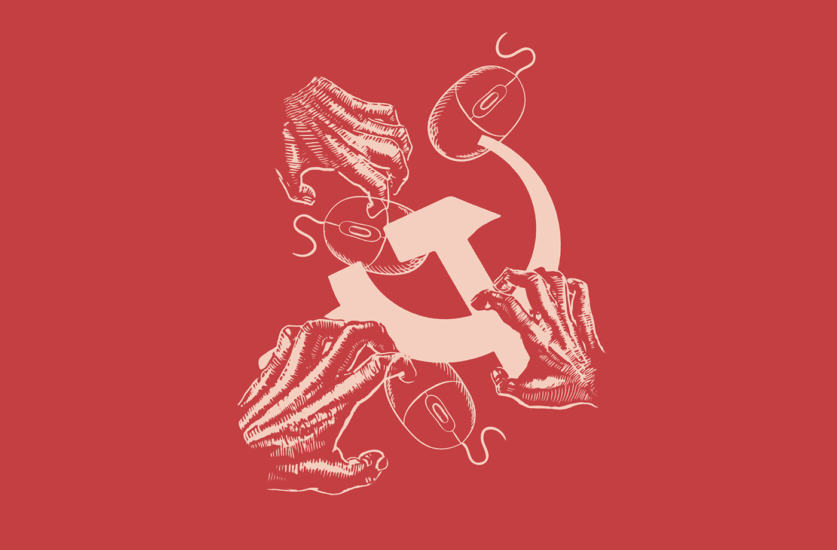The Theorizing the Web conference is in two weeks! In bringing social theory to social media through discussions that are conceptual, critical, and historical, it shares with Real Life a common scope, philosophy, and personnel, so we wanted to preview the topics of its four keynote panels. This one is on socialism and the web. See the others on youth and social media, objectivity, and nerd culture.
Earlier this decade, it was much easier to imagine that online connectivity could serve as an irresistible force against political oppression and for social justice. Resistance movements across the Middle East had toppled or destabilized regimes and the Occupy encampments seemed to foretell the rise of a newly prominent and effective radical politics in the U.S. The role of social media in organizing and sustaining and publicizing these movements was widely touted; it was common to read of “Twitter revolutions” and to see Facebook pages credited with galvanizing the people’s will. There seemed something plausibly socialist about social media, its emerging communities, and its digital commons.
More recently, though, the role of online platforms in fomenting the spread of propaganda, disinformation, and misinformation, and abetting the targeting of oppressed populations has come to the fore. Digital connectivity is being recognized as a means of surveillance as much as a way to organize resistance. And online spaces have proved to be fertile incubators and disseminators of racism, sexism, and other forms of hatred, harassment, and bigotry. Media technology began to be spoken of again as it had been in the mid-20th century, as a means for manipulating the masses and grounding fascist populism and demagoguery.
The tech companies that administer most online spaces and marketplaces obviously have a vested interest in capitalism. They are designed not for political change but for profitability, which has its own entrenched politics. Their business models accordingly foment those conditions that allow them to make money: an atomized and closely watched population that’s been made amenable to advertising, private accumulation, and zero-sum competition with peers for attention and other social benefits. They have inundated us with access to information and each other, but this has mostly made for a more confusing and fearful world. Technology made capitalism’s new limitless demands of flexibility and availability seem plausible; it has extended the potential for productivity and exploitation further and further into what once was considered private life.
The purported neutrality of platforms actually encode a bias in favor of the status quo distributions of power, and algorithmic systems make injustices scalable as their mechanisms become automated and harder to audit. Our decision to use these systems increasingly feels forced, even as it also seems to make us complicit in the damage the platforms cause, and the organization of the world they posit.
But because they depend on the congregation of the people they basically exploit, these corporately owned platforms, like the factory floors of old, also still afford opportunities for solidarity and a shared consciousness, expressed in a shared language, to develop. Maybe that language is a technical language of economic analysis and political strategy. Or maybe it’s memes.
Some have attributed the recent rise of nativist, fascist politics in part to their more effective exploitation of online spaces: Message boards on Reddit and 4chan are supposed to have made fascism seem edgy and “cool.” Right-wing politicians are supposed to have mastered targeted advertising and vote suppression on social media. Libertarian tech billionaires are using their leverage to intimidate or silence journalists while white supremacists wrap themselves in the mantel of free speech while decrying liberal safe spaces and political correctness.
If this analysis is correct, then how should the left respond? Should it try to adopt a combative and irreverent approach to try to out shitpost the shitposters? How does it build on the efforts of Black Lives Matter, MeToo, and other movements which have used hashtags to organize and attract energy and support? Should it focus on building grass-roots support for primary challenges from the left? How can online connections help support unionizing efforts and strikes? What should we think of when we hear about “the online left” — or should we try not to think in those terms at all?
In 2016, an avowed democratic socialist in Bernie Sanders attracted a level of support that surprised most political commentators. In the wake of Donald Trump’s election, the Democratic Socialists of America have added more than 20,000 members. Though socialist is still levied as an epithet, echoing back to the Cold War to imply something is anti-American and against “freedom,” the term is losing its stigma and the core ideals it suggests — health care, education, and a living wage for all — feel more urgent in the face of growing income inequality and increasing generational precarity. It may not have the ring of fully automated luxury communism, but socialism seems primed for rehabilitation.
On this panel, activists, Occupy participants, political analysts, and journalists will assess the status of the left online and consider a variety of political and communication strategies for moving forward.
Panel: Extremely Online Socialism, April 27, 7:30 p.m.
Moderator
Sarah Jaffe
Participants
Alexis Goldstein, Shuja Haider, Emma Caterine, Kevin Borden
Theorizing the Web 2018 is April 27 and 28 at the Museum of the Moving Image, New York City. Register here.
The conference is run on a donation, pay-what-you-can basis with a volunteer committee. For more information about the event, click here.
